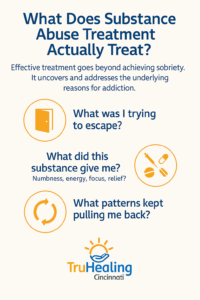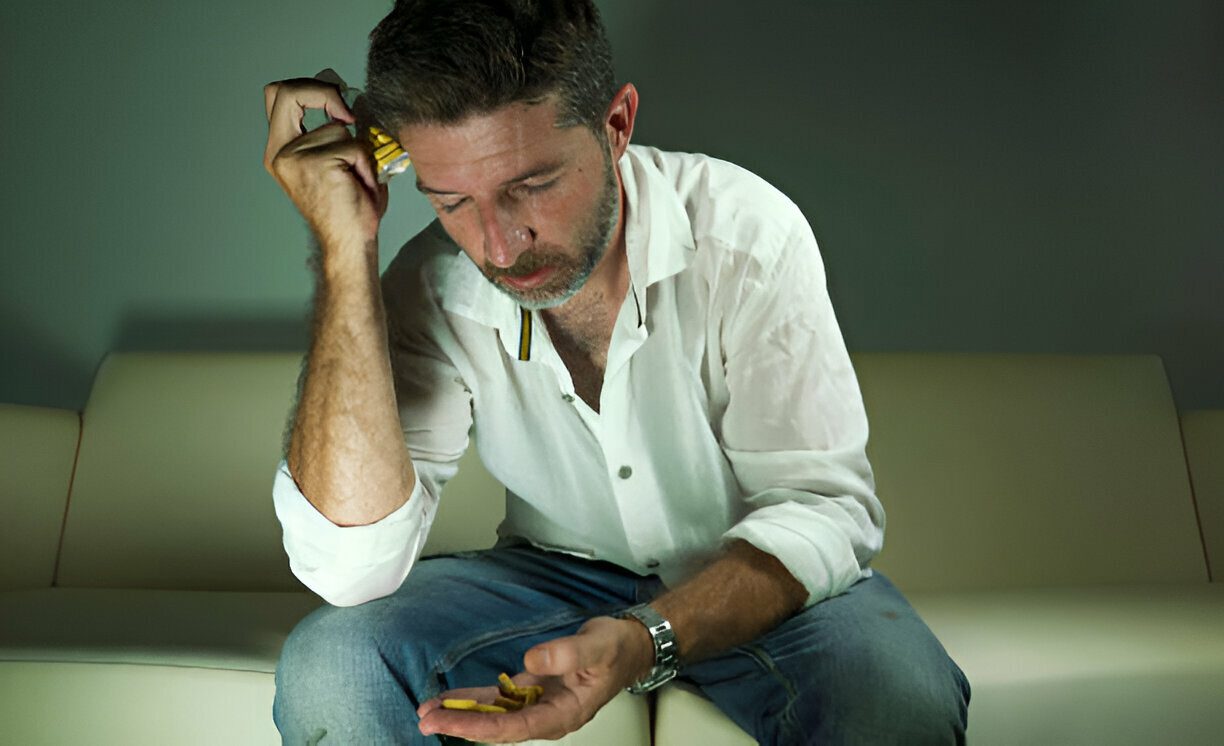Introduction
If you love someone who’s actively using, your world doesn’t just revolve around their addiction—it starts to revolve inside it. Every phone call carries tension. Every silence feels suspicious. You may be holding your breath, hoping treatment is the fix. You may also be wondering… what does substance abuse treatment actually treat?
Is it just about getting sober? Or is there something deeper involved?
At TruHealing Cincinnati, we talk with partners like you every day—people who are holding on with love, worry, and not much left in the tank. This blog is here to give you clarity. Not polished answers or forced optimism. Just insight, steadiness, and a clearer sense of what real treatment can do.
It’s More Than Detox—It’s About Why They Use
Let’s start here: substance abuse treatment is not just about stopping drugs or alcohol. That’s detox, and while it’s essential, it’s just the beginning.
Effective treatment digs underneath the substance use. Because addiction isn’t just a behavior—it’s often a response. To pain. To trauma. To unmanageable emotions. To mental health struggles that went untreated for years.
Substance abuse treatment helps clients explore questions like:
- What was I trying to escape?
- What did this substance give me—numbness, energy, focus, relief?
- What patterns kept pulling me back?
At TruHealing Cincinnati, this exploration happens through therapy (both individual and group), psychiatric support when needed, and evidence-based tools that support emotional regulation and long-term change.
What Happens in a Program—And Why It Impacts You, Too
Your partner might be in a residential program or attending an intensive outpatient program (IOP). Here’s what that typically looks like:
- Individual therapy sessions with an addiction counselor
- Group therapy focused on shared challenges and emotional growth
- Psychoeducation on addiction, relapse prevention, and healthy relationships
- Psychiatric care or medication management, if mental health symptoms are involved
That’s their side. But where does that leave you?
Addiction affects relationships in deep, often invisible ways. You may be walking on eggshells, feeling like a caretaker, or stuck in a cycle of confrontation and apology. Good treatment programs recognize this—and include you.
TruHealing Cincinnati offers family counseling and education that can:
- Help you understand addiction as a chronic, treatable condition
- Guide you in setting healthy boundaries that don’t feel like punishment
- Rebuild communication without emotional chaos
What Treatment Can’t Do—And Why That’s Not Your Fault
This is where many partners feel blindsided: treatment doesn’t always equal change. Not right away.
Even the best programs can’t:
- Force someone to stay sober forever
- Guarantee they won’t lie or relapse again
- Instantly repair years of broken trust
If your partner relapses, it’s not necessarily because they didn’t try. If they hurt you again, it doesn’t mean treatment failed—or that you did.
Healing is a long road. What treatment can do is start that process with structure, support, and clinical insight. But lasting change depends on your partner’s ongoing willingness and work—and your ability to care for yourself, too.

Recovery Isn’t Linear—But Treatment Can Be a Turning Point
Many loved ones ask, “But what if they relapse?” It’s a fair—and painful—question. Here’s the truth: many people relapse. And many people recover after they do.
Relapse isn’t a moral failure. It’s a clinical reality. It often means the person didn’t yet have the tools—or the internal readiness—to sustain sobriety in the face of life’s stressors.
That’s why Substance Abuse Treatment in Cincinnati, like the programs we offer, emphasizes relapse prevention. We don’t just hope clients “stay clean.” We:
- Help them identify triggers and stressors
- Build coping strategies and healthy routines
- Offer step-down levels of care (like IOP or outpatient) to support long-term success
Even if your loved one slips, treatment can lay the groundwork for a different future. Sometimes, it’s the second or third stay that really lands. And if you’re still by their side, your support—steady but boundaried—can make a bigger difference than you realize.
How to Know If a Program Is Truly Helping
Not all treatment centers are created equal. And not every program will be the right fit for your partner.
Here’s what to look for when evaluating substance abuse treatment options in Cincinnati or beyond:
Red flags in low-quality programs:
- Cookie-cutter treatment plans that don’t adjust over time
- Staff without specialized addiction or trauma training
- No family involvement or education
- Lack of aftercare or discharge planning
What to expect from quality care like TruHealing Cincinnati:
- Individualized treatment plans tailored to your partner’s specific needs
- Licensed clinicians and therapists with addiction and mental health training
- Opportunities for you to be included in family therapy or education
- Ongoing care options like outpatient and alumni support
If you’re local to Lexington, Kentucky or Springfield, Ohio, TruHealing offers help that meets you exactly where you are. This isn’t just about getting clean. It’s about helping your partner live differently—and giving you the clarity to decide what’s healthy for you.
FAQ: Substance Abuse Treatment for Loved Ones
How long does substance abuse treatment usually last?
It depends. Residential treatment can range from 30 to 90 days. Outpatient programs might last several months. Long-term success often involves multiple phases, including aftercare or alumni support.
Can I be involved in their treatment?
Yes—and you should be. Most ethical treatment centers, including TruHealing Cincinnati, welcome family involvement. This might include joint sessions, family weekends, or phone consultations with a counselor.
What if they don’t want treatment?
You can’t force someone to change—but you can protect your own mental and emotional health. Sometimes, setting boundaries or seeking your own therapy creates enough shift to motivate them.
What happens if they relapse after treatment?
Relapse is common, especially in early recovery. What matters is how it’s handled. Many programs, including ours, have re-engagement protocols and can support someone returning to care quickly.
How do I take care of myself while they’re in treatment?
Support groups for partners (like Al-Anon or therapy with a clinician who understands addiction) can help. You deserve your own space to process, reflect, and breathe—even if they’re the one in crisis.
You Don’t Have to Do This Alone
At TruHealing Cincinnati, we know that addiction doesn’t just affect the person using—it reshapes the lives of everyone who loves them. If you’re exhausted, scared, or unsure where to go from here, you’re not weak. You’re human.
Call us at (513) 643-9117. We’ll walk you through the treatment options available, answer your questions, and help you figure out what support looks like for both of you.


